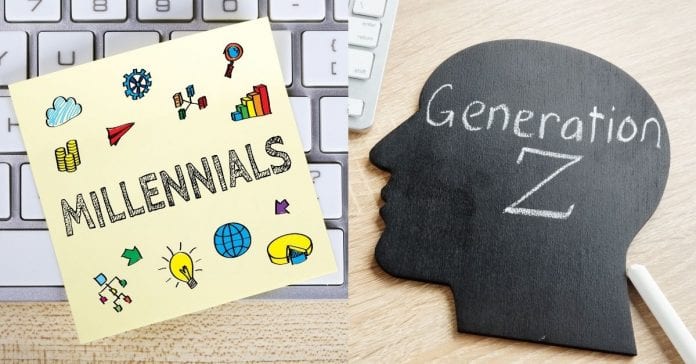We’re not sure who exactly started to name generations, or why. But according to research, the first generation to be named was the Baby Boomers. There’s also no specific or official organisation or commission that decides what each generation is called, or when it starts and ends. In fact, generations often overlap and may differ according to different researchers or studies. All that aside, we’re here to talk about Millennials vs. Gen Z, who are frequently lumped together or mistaken for each other. Though there’s some overlap as is expected, the two generations are actually pretty different!
Millennials
According to the Pew Research Center and other popular media, Millennials are those who are born between 1981 and 1996, though other sources of information may differ. Also known as Generation Y, Millennials’ defining characteristic is probably being digital pioneers, going through everything from dial-up internet to having smartphones.

Gen Z
On the other hand, Generation Z are those born between 1996 – 2015. Compared to Millennials, Gen Z is often described as digital natives, who grew up immersed in a world of technological advances with endless WiFi and a slew of gadgets. They are also known as the “socially-conscious generation”.

Millennials vs. Gen Z
The obvious age difference and tech characteristics aside, how else are these two generations different? Let’s find out!
Issues
Body shaming, cancel culture, depression, cyberbullying… you name it; Gen Z’s got the brunt of it. We’re not dismissing the fact that Millennials (or other generations) may face these issues too, but Gen Z has it the worst, simply because they see more, and are more seen. Constant comparison and certain beauty standards still “upheld” by some can cause more harm than good, and those who are more exposed could be more influenced. However, it’s not all negative. While Gen Z may be the ones more prone to facing certain issues, they are also the ones more willing to speak up and defend (their own or others’) rights. Some Millennials are outspoken as well, but generally as a generation, Gen Z’ers are the more vocal and active advocates.

Finance
Millennials are more focused on experience, while Gen Z is more focused on value and practical products. Both generations actually make fewer purchases compared to the previous generations, but Gen Z is still the more pragmatic generation. (Raise your hand if you are surprised?) Researchers think that Gen Z’ers have these traits as they grew up in periods of recession, as well as the current COVID-19 pandemic. On the other hand, Millennials were brought up fairly comfortably by parents who wanted to give them the best. As such, both generations have a different viewpoint of finance, and Millennials will readily pay for products or services that will provide them with a positive experience. For Gen Z, if it’s not really of value, it’s less likely that they will make that purchase.

Shopping Habits
Millennials actually do more online shopping than Gen Z (again, who’s surprised?), but Gen Z is more likely to make mobile purchases. Gen Z actually prefers brick-and-mortar shopping, so they can ascertain the value and quality of the products before buying them. On the other hand, Millennials probably are making full use of today’s technology: ” I didn’t have access to this before, now I must use it!”.

Working Habits
Millennials are more team-oriented and collaborative, while Gen Z’ers are more independent. Millennials also tend to value other benefits more than salary alone, such as time flexibility. They are the “work to live” type of people, and value family (and friends) over work. Changing jobs regularly is also a norm for them, whereas Gen Z would be more willing to try multiple roles in an organisation. Both generations value transparency and diversity, though Millennials are good at multi-tasking, and Gen Z is good at task-switching. Gen Z, as aforementioned, are more outspoken and wants to be heard. Millennials are also known to challenge the hierarchy status quo. The attention span for Millennials is 12 seconds, and for Gen Z 8 seconds. That’s not to say they don’t pay attention; they simply process information at a faster rate.

Some late Millennials and early Gen Z’ers may share some overlapping characteristics, but evidently both generations are still pretty different. Millennials and Gen Z’ers, do you agree with these characteristics? Let us know in the comments below!















